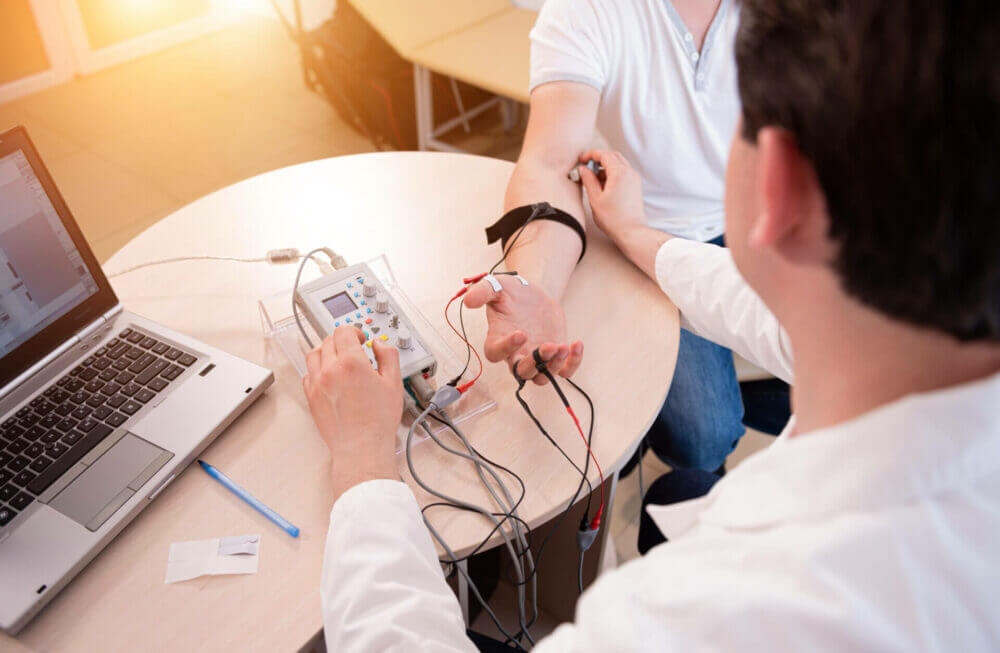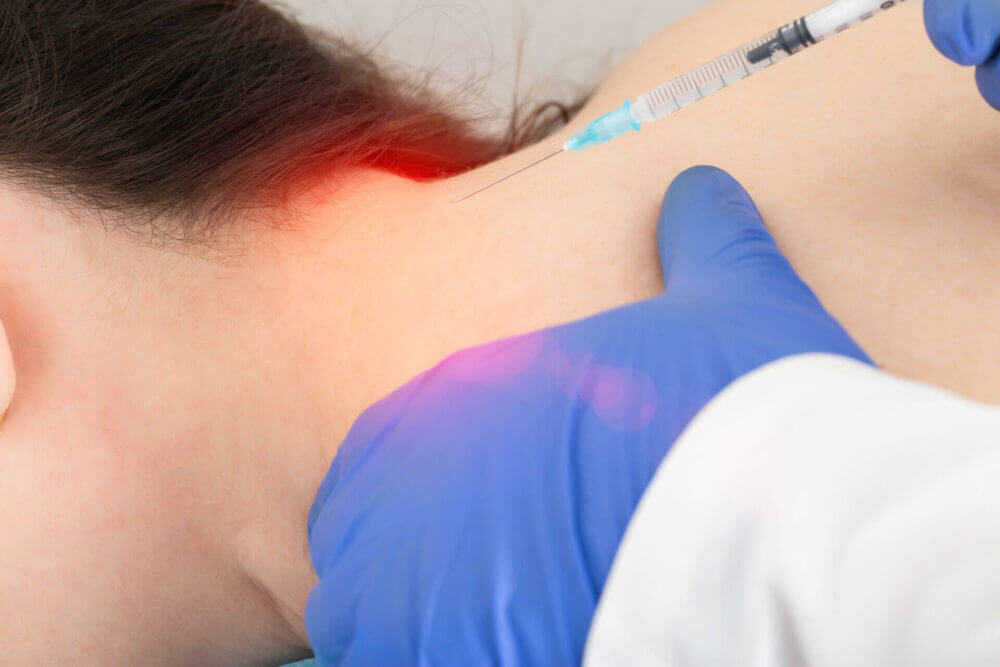Neurological Disorders and Treatments
providing care and treatment for various neurological disorders in Perth which affect the brain and nervous system, including the brain, spinal cord, nerves and muscles.

Botulinum Toxin(BOTOX)
Botulinum Toxin (BOTOX) injection therapy is a treatment option for a range of neurological disorders, such as chronic migraines, muscle spasticity, and certain movement disorders. The procedure involves injecting the product intramuscularly or subcutaneously, which helps to alleviate the symptoms in various ways. In some cases, the injections are guided by EMG or live ultrasound imaging to ensure precise placement and effectiveness.
Dr. Muhammad Aaqib has completed an additional 18 months of training and is proficient in administering botulinum toxin therapy for neurological conditions:
Chronic Migraine
Migraine is a common neurological condition that can range in severity from occasional mild headaches to severe disabling headaches. If you are experiencing chronic headaches, it is possible that you have chronic migraines, which can be treated with Botulinum toxin (BOTOX) injections every three months.
Blepharospasm/hemifacial spasm
Blepharospasm is a type of dystonia that affects the muscles responsible for closing the eyelids, resulting in involuntary blinking and closure of the eyes. In severe cases, it can even prevent the eyes from opening at all. Hemifacial spasm, on the other hand, causes the muscles in the face or eyes to contract involuntarily, which can lead to one-sided pulling of the mouth. Both of these neurological disorders are commonly treated with Botulinum toxin (BOTOX) injections, which are considered the first-line treatment option.
For more information: Click here…
Cervical Dystonia
Dystonia is a neurological disorder that causes abnormal muscle contractions, which can occur intermittently or continuously. This muscle contraction can result in abnormal posture, shaking, or both. The most common type of focal dystonia is cervical dystonia, which affects the muscles of the neck and shoulder, leading to abnormal posture and/or shaking of the neck and shoulder. Botulinum toxin (BOTOX) injections are the first line of treatment for this condition.
For more information: Click here…
Primary Axillary Hyperhidrosis
Excessive sweating is a common issue for some people, but for those with Primary Axillary Hyperhidrosis, it’s a neurological condition that causes even more sweating than usual. This condition is usually primary, which means there’s no specific reason for it. However, it can be caused by many factors, such as thyroid disease or certain medications. While topical creams may offer some relief, injectable therapies may be necessary if other treatments fail.
For more information: Click here…
Bruxism/TMJ Dysfunction
Bruxism is a condition that results in teeth grinding, often occurring during sleep due to excessive jaw clenching. This can lead to teeth damage and jaw discomfort. Botulinum toxin (BOTOX) injections and mouth splints are potential treatments to help stop teeth grinding during sleep.
TMJ dysfunction can cause a limited range of motion in the jaw, as well as clicking or popping sounds, occasional jaw locking, and jaw deviation.
Tremor
Tremors refer to the rhythmic shaking of different parts of the body such as arms, hands, legs or head. There could be various causes of tremors, and an evaluation by a neurologist is usually required to determine the exact cause and appropriate treatment.
Muscle Spasticity
Muscle spasticity is a condition where muscle tone is abnormally increased, resulting in stiffness, fixed posture, and sometimes pain. It can lead to reduced body functions and increased disability. This condition is usually caused by brain or spinal cord damage at birth (such as Cerebral Palsy) or later in life (such as stroke or MS). Botulinum toxin (BOTOX) injections can be used to treat muscle spasticity by relaxing the muscles, thus improving the patient’s quality of life.
What to expect during the appointment?
Before undergoing treatment, you will first meet with a neurologist who will assess your condition to determine if this treatment is suitable for you. Depending on the nature of your condition, the treatment may be administered on the same day or a follow-up appointment may be scheduled for a different day. The initial appointment will take approximately 40-60 minutes, while follow-up appointments will take around 20-30 minutes. If you have long hair, please bring a hair tie for the treatment of chronic migraine or cervical dystonia.
A small dispensary fee is charged directly to you by the dispensing pharmacy after your appointment.

Electrodiagnostics (NCS/EMG)
Testing for many neurological disorders and conditions involves analyzing the electrical signals of nerves (Nerve Conduction Studies) and, at times, muscles (EMG: Electromyography). These tests are useful for diagnosing various nerve and muscle problems, including but not limited to, Carpal Tunnel Syndrome, Ulnar Neuropathy, Peripheral Neuropathy (including Diabetic Neuropathy), Cervical or Lumbosacral Radiculopathy (due to herniated discs or Osteoarthritis), neuromuscular junction problems like Myasthenia Gravis, and various Muscle Diseases.
Nerve Conduction Test
The Nerve Conduction Test is a procedure that measures nerve signals to detect any signs of nerve damage. During the test, electrodes are placed on the skin and a small, safe electrical impulse is applied over the nerve. The electrodes then measure the response or signal from the nerve or a muscle that receives signals from the nerve. The electrical impulse may cause mild discomfort, but it is very brief, and it feels similar to a sharp tapping sensation like a brief impulse from a railing or shopping trolley. The test is completely safe and has no side effects. Additionally, the nerve conduction test can also be performed on legs and feet.
Electromyography (EMG)
In certain situations, EMG (electromyogram) might be necessary to gather more precise information about potential damage to the muscles and nerves. This procedure involves inserting a fine needle electrode into muscles beneath the skin, which acts as a microphone to record the electrical activity in the muscle. During the process, you may feel some discomfort, similar to that of a blood test. If you are taking blood thinning medication such as Warfarin or suffer from haemophilia, kindly inform Dr. Aaqib.
Instructions for the patient
To prepare for this test, all you need to do is ensure that your arms and legs are warm, as the test readings can be affected by cold limbs. Avoid using any creams or moisturizers on your arms and legs before the test. Wear loose clothes that can be easily rolled up above the knees and elbows, as these are the common test sites. The test typically takes between 30 to 45 minutes, so please allocate enough time for it. Results are usually available on the same day as the test.

Clinical Consultation
We provide specialized consultations for all common neurological disorders and conditions, such as those related to the brain, spinal cord, nerves, and muscles. Our services include treatment for a range of conditions, including but not limited to, headaches/migraines, stroke, Parkinson’s disease, epilepsy, neuropathy, nerve pain, cervical or lumbar radiculopathy, myopathy, memory issues/dementia, Multiple Sclerosis, Motor Neuron Disease, and Botulinum toxin (BOTOX) administration for neurological disorders.

Nerve Blocks
Nerve blocks are a common method of treating pain caused by nerve irritation. This involves injecting medications around the specific nerve that causes pain in a particular region. The injected medication numbs the nerve, thus providing relief from pain. Generally, there’s no special preparation required before going for a nerve block procedure.
Examples of nerve blocks include injection around the greater occipital nerve at the back of the head for headache and migraine.
Book an Appointment
